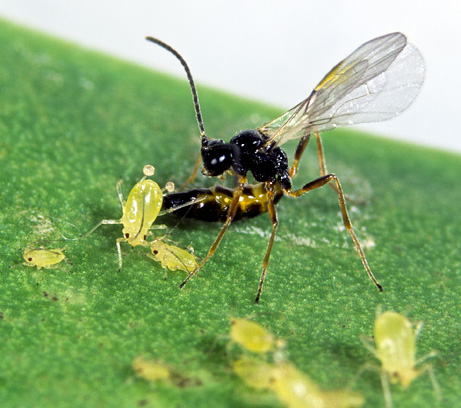Surround the homosexual corpse to protect yourself
Humans - and most animals - don't 'cuddle' the corpse.
However, not aphids. The insect is closely linked to dead species of the same species as a way to avoid parasitic bees, a new study suggests.
A parasitic bee usually lays eggs inside an aphid.After hatching, baby bees eat aphids from the inside out before breaking and flying away.
Usually, when non-predatory animals, such as deer or rabbits, meet dead animals, their instinct is to run away.
That is why Yannick Outreman, of Agrocampus Quest University, France, and colleagues have argued that aphids will do the same thing when the bodies of the same species were killed by parasitic bees.
Aphids reproduce quickly and can produce wings without wings or wings - scientists do not really understand this mechanism. When habitat is threatened by bees, Outreman thinks that aphids will quickly produce winged birds that can fly to a new location more safely.
 (Photo: nationalgeographic.com)
(Photo: nationalgeographic.com)
The researchers commented in their paper that they believe that a 'chemical clue' emitted from aphids will stimulate reproduction of winged offspring. They added: 'Further experiments need to be done to be able to correctly identify this clue'.
However, the aphids have produced a wingless baby.
Outreman said: 'We found that parasitic bees often fly over aphids, and fly near to check if the corpses are no longer there.'
Outreman further explains: 'When bees see the aphids, they think this area has been used by other bees, and therefore do not notice'.
The team found that the close-to-dead aphids of the same species were attacked 30% less than the non-dead tree aphids.
Researchers believe that living close to the same body increases the chances of survival of an individual aphids and the presence of homosexuals is an aphid stimulus that acts like that.
- Software to improve surround sound for MP3 music
- Shocking findings: 94% of giraffes are studied for homosexual relationships
- Decoding homosexual behavior in insects
- Why does Lenin's corpse look more and more fresh?
- Debate about the homosexual sexual orientation of Alexander the Great
- Homosexuals are 5,000 years ago
- The corpse of the corpse is about to bloom
- Evidence of homosexual sex in ancient Egypt
- The first two people infected with Zika virus due to homosexual relationships
- Use dead turtles to save live turtles
- Homosexuality in the animal world
- Insects also 'love' gay
 Animal 'suffering' after hibernation
Animal 'suffering' after hibernation Why do goats climb well?
Why do goats climb well? Scientists were surprised to see chimpanzees eating turtles
Scientists were surprised to see chimpanzees eating turtles Giant catfish died deadly due to drought in Thailand
Giant catfish died deadly due to drought in Thailand Ladybug is 'biological weapon' in the supermarket
Ladybug is 'biological weapon' in the supermarket  Strange insects know photosynthesis like trees
Strange insects know photosynthesis like trees  Aphids survive on infected bacteria
Aphids survive on infected bacteria  Interesting insect world
Interesting insect world  White cotton aphids damage sugarcane
White cotton aphids damage sugarcane 